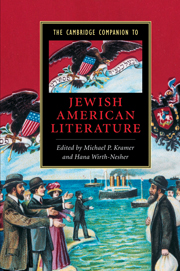Book contents
- Frontmatter
- Introduction: Jewish American literatures in the making
- 1 Beginnings and ends: the origins of Jewish American literary history
- 2 Imagining Judaism in America
- 3 Of crucibles and grandfathers: the East European immigrants
- 4 Coney Island, USA: America in the Yiddish literary imagination
- 5 Hebrew literature in America
- 6 Traces of the past: multilingual Jewish American writing
- 7 Accents of the future: Jewish American popular culture
- 8 Jewish American poetry
- 9 Jewish American writers on the Left
- 10 Jewish American renaissance
- 11 The Holocaust in the Jewish American literary imagination
- 12 Jewish American women writers and the race question
- 13 On contemporary literary theory and Jewish American poetics
- 14 Identity matters: contemporary Jewish American writing
- Index
- Series List
Introduction: Jewish American literatures in the making
Published online by Cambridge University Press: 28 May 2006
- Frontmatter
- Introduction: Jewish American literatures in the making
- 1 Beginnings and ends: the origins of Jewish American literary history
- 2 Imagining Judaism in America
- 3 Of crucibles and grandfathers: the East European immigrants
- 4 Coney Island, USA: America in the Yiddish literary imagination
- 5 Hebrew literature in America
- 6 Traces of the past: multilingual Jewish American writing
- 7 Accents of the future: Jewish American popular culture
- 8 Jewish American poetry
- 9 Jewish American writers on the Left
- 10 Jewish American renaissance
- 11 The Holocaust in the Jewish American literary imagination
- 12 Jewish American women writers and the race question
- 13 On contemporary literary theory and Jewish American poetics
- 14 Identity matters: contemporary Jewish American writing
- Index
- Series List
Summary
“Try not to love such a country!” exclaims Mottel the cantor's son, the orphaned Russian Jewish immigrant child in Sholem Aleichem's only New World novel, when he discovers that in America “it's not allowed to hit somebody smaller than yourself” (Adventures of Mottel the Cantor's Son, 260). Mottel's bittersweet Yiddish praise echoes – if unintentionally and somewhat ironically – a declaration made more than a hundred years earlier by the Sephardi banker Moses Seixas, warden of the Hebrew Congregation in Newport, Rhode Island, in an address to George Washington, newly elected President of the United States:
Deprived as we hitherto have been of the invaluable rights of free citizens, we now...behold a government erected by the majesty of the people, a government which to bigotry gives no sanction, to persecution no assistance, but generously affording to all liberty of conscience and immunities of citizenship, deeming every one of whatever nation, tongue or language, equal parts of the great governmental machine.
(Schappes, A Documentary History of the Jews, 79)These two passages help chart an important theme in the history of Jewish life in America. For millennia, Jews had lived under the rule of many other peoples, both in the Land of Israel and in exile in Europe, Africa, Asia, and South America. They sometimes enjoyed periods of tolerance, prosperity, and quasi-autonomy; often they suffered oppression, poverty, and violence. Throughout their history, in good times and bad, the Jews were considered to be different – religiously, ethnically, racially, and hence politically – a distinction, by the way, they did not always contest. When they came to America, however, they discovered – whether with unambiguous relief, or cautious optimism, or seasoned skepticism – that America was different.
- Type
- Chapter
- Information
- Publisher: Cambridge University PressPrint publication year: 2003



